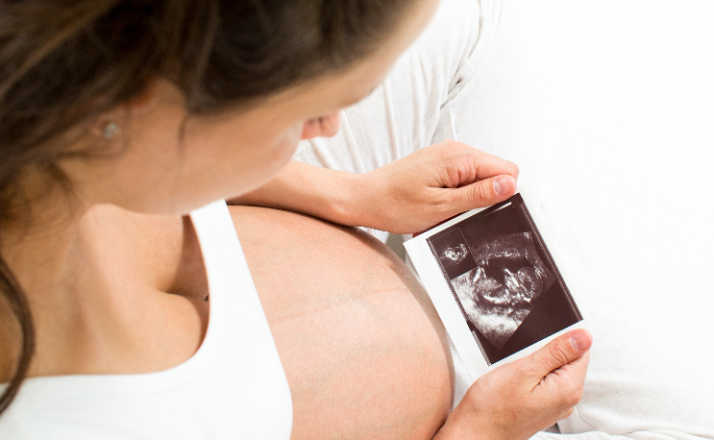I was thirty when I had my first child. It was both a welcome surprise and quiet longing for that pregnancy to finally happen, and when it did, everything went smoothly. Until it didn’t.
My son was born with a lightning strike diagnosis of hemophilia. This relatively famous, albeit widely misunderstood, bleeding disorder wasn’t in our family history.
It would turn out to be cripplingly expensive and heart-wrenching to treat at first. But eventually, we figured out a path forward and went on to have two more children.
Before my other two children could take their first breaths, my doctors made me go through a battery of frightening tests to root out any other potential surprises.
Those tests looked for other rare genetic disorders, and since we had already been through the wringer with our first child, wouldn’t we want to know what else could be lurking in our DNA?
The amount of fear and guilt that question sent through me was enormous, and to this day, I still feel angry at my doctors about it.
According to a New York Times investigation, most, if not all, of those tests offered to pregnant women are wildly inaccurate, and the history about how they came to be on the market and in your doctor’s office is just as eyebrow-raising as the tests themselves.
As the Times explains it, there has been a considerable increase in companies offering prenatal tests that can detect genetic disorders very early in pregnancy over the past decade.
They started out looking for Down Syndrome and were apparently quite good and reliable at doing just that.
But as these small, greedy companies realized that they could leverage an expecting mother’s worst fears when it comes to the “what if…?” question game they began to offer more and more tests that looked for more and obscure conditions.
But these tests seldom work accurately.
The New York Times points out that error rates are as high as 93%. So, was it just the money these companies wanted? After all, as the New York Times points out, they serve one-third of American women.
That’s a huge market.
The tests in question are looking for a microdeletion, which is when a chromosome is missing a piece of itself, or there is an extra copy of a chromosome that just shouldn’t be there.

Originally, these microdeletion tests were meant to identify Down’s Syndrome, and those tests are accurate, safe, and in widespread use.
But when researchers attempted to drill down into other increasingly rare disorders that the average person has likely never heard of, the tests began to break down and stop working.
The tests are sold as an optional supplement to the Down Syndrome test kits, and it is up to doctors to determine if they should order one.
Still, these tests are everywhere.
One company called Natera told the New York Times that in 2020 they had run more than 400,000 screenings for a condition called DiGeorge syndrome, which is very rare.
That works out to be 10% of pregnant Americans.
So, how inaccurate are these prenatal tests? This is what the New York Times investigation found:
Cri-du-chat syndrome 80% wrong
Cri-du-chat syndrome affects 1 in 15,000 births and commonly includes symptoms such as cat-like cry, small head, intellectual liabilities, growth delays, and behavioral problems.
DiGeorge syndrome 81% wrong
DiGeorge syndrome affects 1 in 4,000 births and commonly includes a long list of symptoms some of which are heart defects, hearing loss, learning disabilities, seizures, psychiatric illness, eye abnormalities, and central nervous system abnormalities.
1p36 deletion syndrome 84% wrong
1p36 deletion syndrome affects 1 in 5,000 births and can cause severe intellectual disability including absent speech development, brain atrophy in which the outer layer of the brain decreases in size due to loss of brain cells, and
Wolf-Hirschhorn syndrome 86% wrong
Wolf-Hirschhorn syndrome affects 1 in 20,000 births and causes distinctive facial features known as the “Greek warrior helmet” appearance. It can also cause seizures, delayed growth, and intellectual disabilities.
Prader-Willi and Angelman syndromes 93% wrong
Prader-Willi and Angelman syndromes affect 1 in 20,000 births and can cause inability to control urges to eat, seizures, behavioral problems, intellectual disabilities, and incomplete sexual development.
If you’re scratching your head at why these prenatal tests that clearly perform so terribly are even being ordered in the first place, you’re not alone.
“It’s a little like running mammograms on kids,” Mary Norton, an obstetrician, and geneticist from the University of California, San Francisco told the New York Times.
“The chance of breast cancer is so low, so why are you doing it? I think it’s purely a marketing thing.”
What is absolutely jaw-dropping, is how much potential danger these inaccurate tests could put expecting moms in.
Think about it. These tests come back positive and what is your doctor going to say?
They are going to order follow-up tests, which often cost thousands of dollars, and include an invasive procedure that requires a doctor to take a sample of amniotic fluid.
The danger here is that taking such a sample can lead to a miscarriage.
To get a clear view of just how unsettling the New York Times investigations finding are, definitely check out the full article linked below.
They have an interactive section that shows just how ridiculous it is that these companies are scaring the crap out of pregnant people by looking for the rarest of disorders that they are statistically not likely to find.
Have you had any of these tests? Share your experience in the comments.











